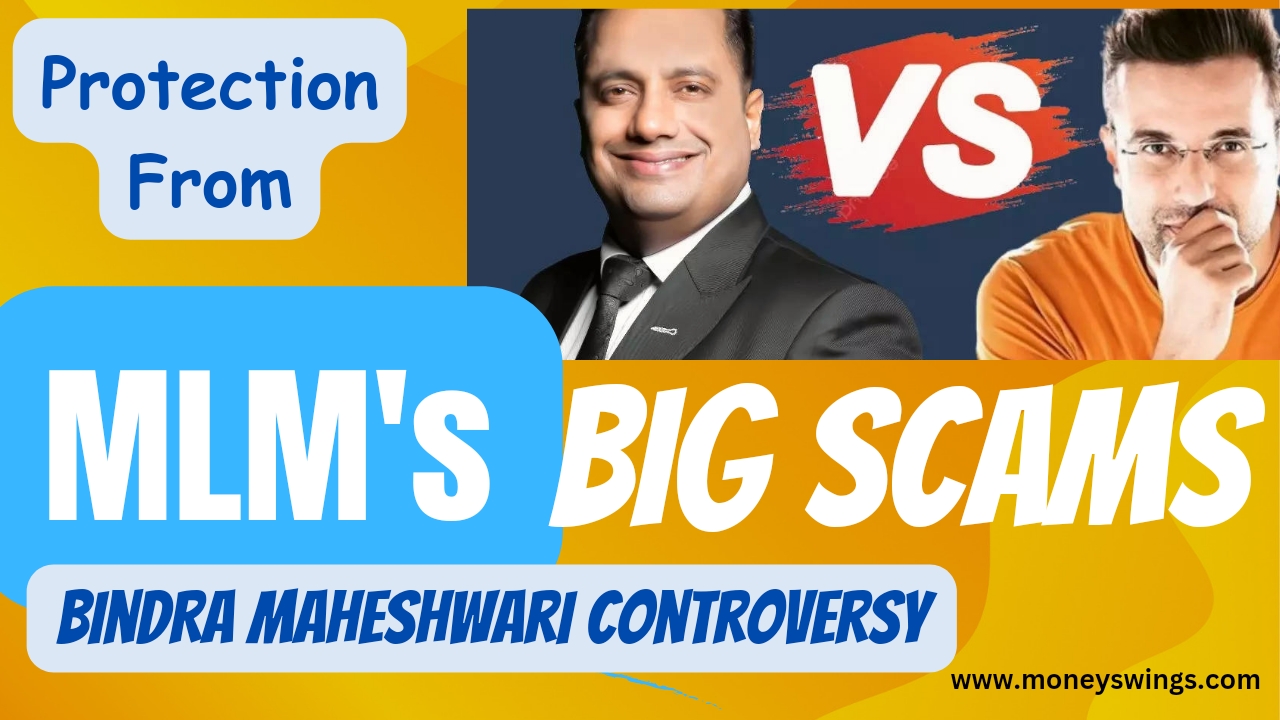Unmasking MLM Scam -A Consumer’s Guide to Navigating the Maze of Direct Selling in India : Sandeep Maheshwari vs. Vivek Bindra exposes the dark side of MLM schemes disguised as legitimate direct selling. This article decodes the Consumer Protection (Direct Selling) Rules, 2021, empowering you to identify red flags and stay safe. Learn the DOs and DON’Ts for young achievers and tackle slippery snakes who exploit loopholes. Together, let’s shine a light on ethical practices and build a thriving, transparent market.
Introduction
The recent spat between motivational speakers Sandeep Maheshwari and Vivek Bindra has sent shockwaves through the digital realm. Maheshwari’s explosive video of Big Scam Exposed and Mr. Vivek Bindra reaction to this video has sparked a heated debate.
Maheshwari’s exposure to Bindra of running a “multi-level marketing” (MLM) scam with a staggering 500 crores at stake has ignited the dark side of MLMs. But beyond the personal accusations, this controversy illuminates a critical issue: the deceptive practices woven into the fabric of some MLM schemes and the measures being taken to protect consumers.
What is MLM scheme?

So, what exactly is a MLM scheme, and how can you differentiate it from legitimate direct selling? MLMs often recruit participants by promising extravagant income through selling their products, with the emphasis placed on recruiting new members to the pyramid-like structure. The crux of the scam lies in the emphasis on recruitment, where profits primarily come from downline purchases rather than actual product sales.
This controversy isn’t the first of its kind, and it highlights the need for vigilance against such predatory practices. In fact Sandeep Maheshwari vs. Vivek Bindra controversy has brought the spotlight on the murky world of MLM schemes disguised as legitimate direct selling. But fear not, discerning consumers! The Consumer Protection (Direct Selling) Rules, 2021, are here to help you navigate this maze with confidence. Thankfully, the Indian government has stepped in with the Consumer Protection (Direct Selling) Rules, 2021, aimed at curbing unfair trade practices and protecting consumers from scams masquerading as direct selling.
How Consumer Protection (Direct Selling) Rules, 2021, act as a shield against MLM scams:
- Pyramid Schemes are Out: The rules explicitly prohibit pyramid schemes, ensuring companies focus on product sales, not just recruitment.
- Transparency Reigns Supreme: Direct selling entities must maintain transparent websites with details about their business, products, and grievance redressal mechanisms. This empowers consumers to make informed decisions.
- Fair Dealing is Mandatory: Misleading claims, misrepresentation of products, and harassment are strictly prohibited, creating a more ethical business environment.
- Consumer is King: The rules establish grievance redressal mechanisms and empower consumers to seek compensation for unfair practices.
Other Rules/Acts by Indian Government against unfair Direct Selling
While the Consumer Protection (Direct Selling) Rules, 2021, have undoubtedly taken a significant step in regulating the direct selling industry, they are not the only line of defense against scams and unethical practices. Both consumers and direct selling companies can benefit from understanding additional regulations and initiatives by the Indian government and RBI that offer further protection and promote responsible business.
For Consumers:
- The Indian Penal Code (IPC): Section 420 of the IPC deals with cheating and dishonesty, providing legal recourse for consumers deceived by fraudulent practices in direct selling.
- The Foreign Exchange Management Act (FEMA): This act regulates foreign exchange transactions, ensuring financial safeguards for consumers when dealing with direct selling companies involved in cross-border operations.
- The Reserve Bank of India (RBI): The RBI issues guidelines and regulations governing microfinance institutions (MFIs) that may be involved in financing direct selling activities. Understanding these guidelines helps consumers make informed decisions when accessing credit through such schemes.
- Consumer Awareness Initiatives: The Department of Consumer Affairs actively promotes consumer awareness about their rights and responsibilities. Resources like the National Consumer Helpline and informative campaigns empower consumers to identify red flags and report unfair practices.
For Direct Selling Companies:
- The Companies Act, 2013: This act governs the incorporation and operation of companies in India, ensuring responsible corporate governance and transparency in financial reporting, which benefits both consumers and investors.
- The Competition Act, 2002: This act prohibits unfair trade practices within the market, ensuring a level playing field for ethical direct selling companies and protecting consumers from anti-competitive tactics.
- The RBI Guidelines on Digital Payments: These guidelines regulate digital transactions, ensuring secure and transparent payment mechanisms for both consumers and companies involved in direct selling.
- Self-Regulatory Organizations (SROs): Industry-led SROs like the Indian Direct Selling Association (IDSA) promote ethical practices and self-regulation within the direct selling industry. This fosters a more responsible and consumer-centric environment.
Slippery Snakes: How Fake Direct Selling Companies Slither Through Legal Loopholes
While the Consumer Protection (Direct Selling) Rules, 2021 and other acts have tightened the noose around predatory MLM schemes, some fake direct selling companies still manage to wiggle free like slippery snakes. These loopholes, often exploiting ambiguities in the law and the gullibility of consumers, pose a persistent threat. Let’s shed light on some common tactics:
- The Name Game: Many companies disguise themselves under names that bear little resemblance to direct selling, avoiding immediate scrutiny. They operate through seemingly legitimate businesses like wellness workshops or personal development seminars, blurring the lines and making it harder to identify their true nature.
- The Recruitment Masquerade: Instead of blatantly peddling pyramid schemes, these companies focus on “team building” and “leadership development.” They recruit new members on the promise of building a network, downplaying the emphasis on product sales and skirting the definition of pyramid schemes.
- The Hidden Cost Trap: While entry fees might be minimal, companies often lure members with additional “packages” offering higher earning potential. These packages contain expensive products or subscriptions, pushing the total investment beyond reach for many and skewing the income-expense balance.
- The Misinformation Maze: Fake companies bombard potential recruits with fabricated testimonials, inflated income claims, and misleading statistics. They exploit social media, influencer marketing, and even fake news websites to create a veneer of legitimacy, making it difficult for consumers to discern truth from fiction.
- The Legal Limbo: Certain companies operate in the grey area between direct selling and e-commerce, exploiting unclear definitions in the rules. They leverage online platforms to sell products, claiming they fulfill the product-centric requirement while still focusing on recruitment and downline commissions.
- The Regulatory Runaround: Many companies operate from jurisdictions with lax regulations or weak enforcement mechanisms. This makes it challenging for authorities to track down fraudulent activities and bring them to justice, leaving consumers vulnerable and their complaints unheard.
The Authority of the Law:
Despite these loopholes, legal recourse exists. The Indian Penal Code (IPC), Competition Act, and provisions within the Companies Act can penalize deceptive practices, unfair trade competition, and financial fraud. Additionally, the Consumer Protection Rules empower consumers to seek redressal through Grievance Redressal Committees and the National Consumer Helpline.
Staying Safe:
Consumers need to stay vigilant and informed. Research extensively, ask critical questions, and don’t be swayed by extravagant promises. Familiarize yourself with the red flags outlined in the Direct Selling Rules and report any suspicious activity to the authorities. Remember, if something sounds too good to be true, it probably is.
Moving Forward:
Combating such loopholes requires a multi- pronged approach. Strengthening regulations, enhancing regulatory capacity, and promoting consumer awareness are crucial steps. Additionally, social media platforms need to take responsibility for curbing misleading content and collaborating with authorities to identify and dismantle fraudulent networks.
By understanding and utilizing these regulations and initiatives, both consumers and direct selling companies can navigate the world of direct selling with greater confidence and ensure a thriving industry built on trust and transparency.
Here’s a handy guide to what direct selling companies can and can’t do under these new regulations:
The DOs:
- Transparency is Key: Maintain a clear and updated website with company details, product information, pricing, and grievance redressal mechanisms.
- Fair Play Matters: Avoid misleading claims, misrepresentation of products, and unfair sales practices. Be upfront about income potential and focus on actual product sales, not just recruitment.
- Empower Consumers: Provide accurate information about return policies, refunds, and warranties. Make it easy for consumers to file complaints and seek redressal.
- Embrace Legality: Ensure your company is properly registered and complies with all legal requirements, including the Legal Metrology Act and the Insolvency and Bankruptcy Code.
- Embrace Ethics: Partner with the National Consumer Helpline to demonstrate dedication to consumer protection.
The DON’Ts:
- No Pyramid Schemes: Steer clear of any practices resembling pyramid schemes, where the emphasis is on recruiting new members instead of product sales.
- Money Circulation Schemes are Taboo: Don’t engage in schemes where money circulates within the system without actual product transactions or value creation.
- No Entry for Fraudsters: Don’t tolerate fraudulent activities within your network and take proactive steps to prevent misrepresentation and deception.
- Don’t Scare and Pressure: Avoid forceful marketing tactics, harassment, or coercion to persuade potential buyers.
- No Hidden Fees: Be transparent about all costs, including entry fees, subscription fees, and additional charges like postage or handling.
- False Promises are Forbidden: Don’t exaggerate income potential or make guarantees beyond what’s legally permissible.
- Respect Privacy: Protect the personal information of consumers and handle it responsibly according to data privacy laws.
By following these “Do’s and Don’ts,” direct selling companies can operate with integrity and protect themselves from legal repercussions.
Direct Selling: Decoding the Maze for Youngsters – Do’s and Don’ts to Stay Safe
Yo, young achievers! Want to build your hustle? Direct selling might seem like a tempting path, but navigating its twists and turns can be tricky. Don’t get lured by flashy promises and end up in a scam! Here’s the lowdown on the dos and don’ts of this game, keeping in mind the Consumer Protection (Direct Selling) Rules, 2021, and other regulations, so you can chase your dreams responsibly.
DOs:
- Research, Research, Research!: Before saying “yes” to any opportunity, dig deep. Check the company’s website, read reviews, and talk to existing members. Get the full picture, not just the shiny veneer.
- Be Money-Smart: Don’t invest blindly. Understand the costs involved – entry fees, products, travel – and ensure it aligns with your budget and potential returns. Remember, income promises are just estimates, not guarantees.
- Question the Pyramid: If recruitment seems more important than selling products, walk away. Pyramid schemes are illegal and risky. Focus on companies with genuine products and sustainable strategies.
- Know Your Rights: You have the right to accurate information, clear contracts, and a cooling-off period. Don’t be pressured into quick decisions. Remember, hesitation doesn’t equal failure, it shows smart consumerism.
- Stay Informed: Keep yourself updated about the Consumer Protection Rules and other regulations. Educate yourself on red flags like exaggerated income claims, aggressive marketing tactics, and lack of transparency.
- Seek Help: If something feels off, don’t hesitate to report it. File complaints with the National Consumer Helpline or relevant authorities. Your voice matters in building a fair and ethical market.
DON’Ts:
- Get Blinded by Bling: Don’t fall for promises of quick riches and luxurious lifestyles. True success takes time, hard work, and genuine value creation, not just flashy cars and fancy trips.
- Sell Your Soul: Don’t let anyone pressure you into bugging your friends and family. Responsible selling means respecting boundaries and focusing on genuine connections, not manipulative tactics.
- Get Blinded by Bling: Don’t fall for promises of quick riches and luxurious lifestyles. True success takes time, hard work, and genuine value creation, not just flashy cars and fancy trips.
- Sell Your Soul: Don’t let anyone pressure you into bugging your friends and family. Responsible selling means respecting boundaries and focusing on genuine connections, not manipulative tactics.
- Sacrifice Education: Your education is your bedrock. Don’t neglect studies or let direct selling become your sole focus. Balance is key, and academic growth opens doors to more options in the future.
- Ignore the Legal Lines: Don’t engage in any activity that violates the Direct Ignore the Legal Lines: Don’t engage in any activity that violates the Direct Selling Rules or other regulations. Ignorance is not bliss here; understanding the law protects you and others.
- Rush into Debt: Avoid taking loans or maxing out credit cards for direct selling ventures. Financial risks can snowball quickly, so tread cautiously and prioritize responsible financial decisions.
- Blindly Trust the Hype: Remember, social media portrayals are often curated. Don’t compare your starting point to someone else’s highlight reel. Stay grounded in reality and focus on your own sustainable journey.
By following these dos and don’ts, you can navigate the world of direct selling with your eyes wide open. Remember, it’s not a get point to someone else’s highlight reel. Stay grounded in reality and focus on your own sustainable journey.
Conclusion:
Remember, consumer awareness and responsible business practices go hand-in- hand. Let’s work together to create a direct selling landscape that benefits everyone!
As consumers, we must educate ourselves about legitimate direct selling practices and the red flags of MLM scams. By staying informed and utilizing the protections offered by the new Consumer Protection Rules, we can navigate the world of direct selling with confidence and safeguard ourselves from falling victim to the next “big scam.”
Let’s work together to shed light on these cunning tactics and empower consumers to navigate the complex world of direct selling safely. By closing the loopholes and raising awareness, we can create a more transparent and ethical market for legitimate businesses to thrive.
Spread the word! Share this information with your network to raise awareness and create a more ethical and transparent direct selling landscape in India.



4 thoughts on “The Big Scam Exposed: Demystifying the Sandeep Maheshwari vs. Vivek Bindra Controversy and Protecting Yourself from MLM Schemes”